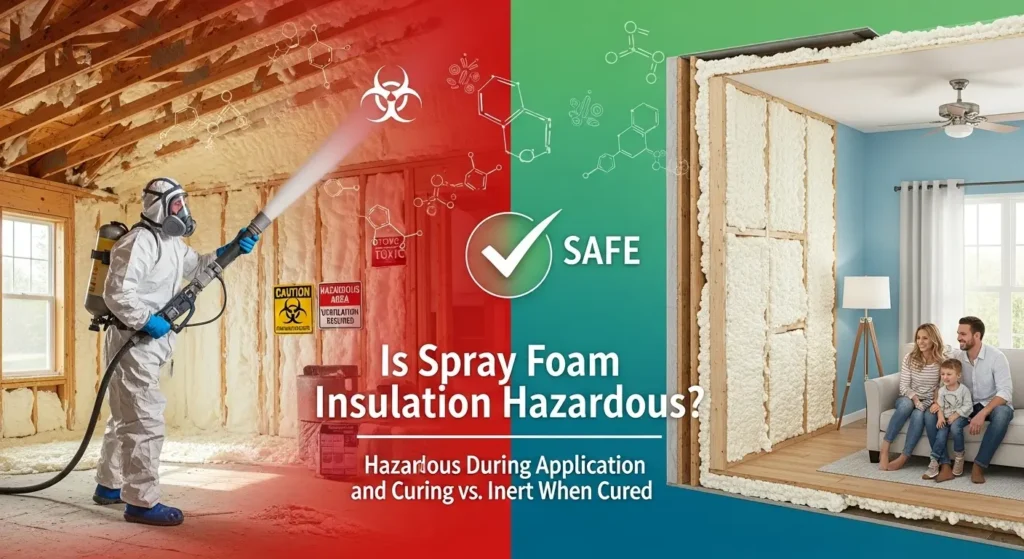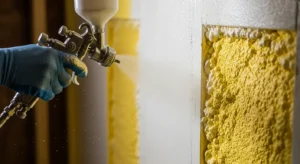When it comes to improving your home’s energy efficiency, spray foam insulation has become one of the most popular choices in New York City. Homeowners love it for its ability to seal air leaks, regulate indoor temperatures, and reduce energy bills. But with its growing use, an important question often comes up — is spray foam insulation hazardous?
If you’re considering spray foam insulation in NYC, understanding how it works, its safety concerns, and how to ensure it’s applied correctly can help you make a confident, informed decision. Let’s break it down in simple terms.
Understanding What Spray Foam Insulation Really Is
Spray foam insulation is a chemical product created by mixing two materials isocyanate and polyol resin, that react when combined. This reaction creates a foam that expands quickly and hardens in place, forming a tight seal against air and moisture leaks.
There are two main types of spray foam insulation:
-
Open-cell spray foam – Softer and more flexible, used for interior walls and soundproofing.
-
Closed-cell spray foam – Denser and moisture-resistant, commonly used for basements, crawl spaces, and attics.
When installed by trained insulation contractors, spray foam creates an energy-efficient barrier that lasts for years and significantly improves comfort. However, the question of safety arises mostly during and shortly after installation not necessarily after it’s fully cured.
The Science Behind Spray Foam: Why Some People Call It Hazardous
The idea that spray foam insulation is hazardous mainly stems from its chemical ingredients and the installation process. During application, the foam releases gases and fumes that can irritate the eyes, nose, and respiratory system.
If you’ve ever walked into a freshly insulated area and noticed a strong chemical odor that’s the result of volatile organic compounds (VOCs) and isocyanates being released during the curing process.
These chemicals are why only trained spray foam insulation contractors should handle the installation. They wear protective gear, ventilate the area properly, and make sure no one enters until the foam has fully cured.
Once the foam is hardened and cured (usually within 24–48 hours), it becomes inert and stable, meaning it’s no longer actively releasing harmful chemicals into the air.
Read More: Is Spray Foam Insulation Safe? A Complete Safety Guide 2025
When Spray Foam Insulation Becomes a Problem
While spray foam insulation itself isn’t automatically dangerous, problems arise when it’s improperly mixed or applied. The two components isocyanate and polyol must be mixed in exact proportions at a specific temperature.
If this balance is off, the foam may:
-
Release unpleasant odors for weeks or even months
-
Fail to cure properly, remaining soft or sticky
-
Continue to off-gas harmful fumes
-
Cause respiratory irritation or allergic reactions
Poor installation is often the main reason homeowners report issues such as headaches, coughing, or strong smells. This is why choosing an experienced spray foam insulation company in NYC is critical. Professional contractors know how to handle the chemicals safely, maintain correct ratios, and ensure proper ventilation throughout the process.
What Happens During Spray Foam Application
A professional insulation contractor typically follows a detailed process to ensure safety and effectiveness:
-
Preparation: The area is cleared, and all occupants (including pets) are advised to leave the space for 24–48 hours.
-
Mixing: The chemicals are heated and mixed on-site using specialized equipment.
-
Application: The foam is sprayed evenly onto walls, attics, or crawl spaces using a spray gun.
-
Curing: The foam expands and hardens, creating an airtight barrier. During this time, the area must remain ventilated.
-
Inspection: Once the foam cures, professionals check for proper installation and air quality before allowing re-entry.
When these steps are followed correctly, the risks associated with spray foam insulation are minimal.
Health Concerns Associated with Spray Foam
During the installation phase, exposure to isocyanates can cause short-term symptoms such as:
-
Eye and throat irritation
-
Sneezing or coughing
-
Skin rashes
-
Shortness of breath
However, these issues generally occur only during or immediately after installation. Once the foam is cured and the space has been ventilated, it should not cause ongoing problems.
In rare cases, individuals with asthma or severe chemical sensitivities may continue to experience discomfort from lingering odors. For those with respiratory issues, consulting with your insulation contractor before installation is always wise.
Environmental and Indoor Air Quality Considerations
One major advantage of spray foam insulation is that it improves energy efficiency, reducing heating and cooling costs. This translates to lower carbon emissions and a smaller environmental footprint.
However, the manufacturing process of spray foam does involve chemicals that can release greenhouse gases. The good news is that many modern spray foam products now use eco-friendly blowing agents with lower global warming potential.
When applied properly, spray foam insulation can actually enhance indoor air quality by sealing off gaps that would otherwise allow dust, pollen, and outdoor pollutants to enter your home.
How to Know If Spray Foam Is Right for You
If you’re thinking about installing spray foam insulation in NYC, here are a few things to consider:
-
Your building type: Spray foam works well in both new construction and existing homes.
-
Budget: It can be more expensive upfront compared to fiberglass or cellulose insulation, but it offers long-term savings.
-
Allergies or sensitivities: If anyone in your home has chemical sensitivities, discuss alternative insulation options with your contractor.
-
Ventilation: Make sure the space has adequate airflow during and after installation to help the foam cure properly.
A reputable spray foam insulation company will assess your property and recommend the safest, most effective insulation type based on your needs.
Signs of a Poor Spray Foam Installation
While high-quality spray foam installations rarely cause issues, it’s important to know what to watch out for. Signs of poor installation include:
-
Strong chemical odors lingering for weeks
-
Foam that cracks, peels, or shrinks over time
-
Discoloration or sticky texture
-
Unexplained respiratory symptoms among occupants
If you experience these problems, contact your insulation contractors immediately for an inspection. They can test air quality, determine if the foam was improperly mixed, and suggest corrective steps.
Alternatives to Spray Foam Insulation
For homeowners who are still uncertain about using spray foam, there are safe alternatives that provide good insulation without chemical application:
-
Fiberglass insulation: Budget-friendly, easy to install, and non-toxic when handled correctly.
-
Cellulose insulation: Made from recycled paper, treated to be fire-resistant.
-
Mineral wool insulation: Offers excellent soundproofing and fire resistance.
While these options may not seal air leaks as tightly as spray foam, they still provide effective thermal insulation when installed properly.
The Role of Professional Spray Foam Insulation Contractors
The key to safe and effective spray foam insulation lies in hiring qualified contractors who understand the product and installation techniques.
Experienced spray foam insulation contractors use advanced safety equipment and adhere to strict application standards. They ensure:
-
The foam is properly mixed and evenly applied
-
Adequate ventilation is maintained
-
The curing process is carefully monitored
-
All safety guidelines are followed
Attempting a DIY installation may seem tempting, but the risks of mishandling chemicals, improper ratios, or incomplete curing can lead to serious health and structural problems. Always rely on certified professionals who specialize in spray foam insulation services in NYC.
Read More: Why Spray Foam Insulation is the Best Choice for NYC Homes
Is Spray Foam Safe Once It’s Cured?
Yes — once the foam is fully cured and hardened, it becomes stable and safe. It no longer releases fumes or chemicals and serves as an excellent air and moisture barrier. In fact, cured spray foam can even prevent mold growth by reducing condensation and air infiltration.
Homeowners who’ve had properly installed spray foam insulation often notice:
-
Lower utility bills
-
Fewer drafts
-
Reduced allergens
-
A more comfortable home environment
So while the installation phase needs careful management, the long-term benefits outweigh the short-term precautions.
Making an Informed Choice
In a city like New York, where winters are cold and summers can be hot and humid, proper insulation makes a huge difference in comfort and cost. Spray foam insulation is not inherently hazardous it’s the installation process and product quality that determine how safe it truly is.
When handled by certified professionals, it’s one of the most durable and efficient insulation options available today. Just make sure to work with experienced insulation contractors in NYC who follow safety protocols and use high-quality materials.
If you’re ready to improve your home’s comfort and energy efficiency, trust experienced professionals who understand both the science and safety of insulation. For reliable, safe, and expert spray foam insulation, reach out to Air Seal IS — a trusted name committed to delivering high-quality insulation solutions that keep your home safe, comfortable, and energy-efficient all year round.



